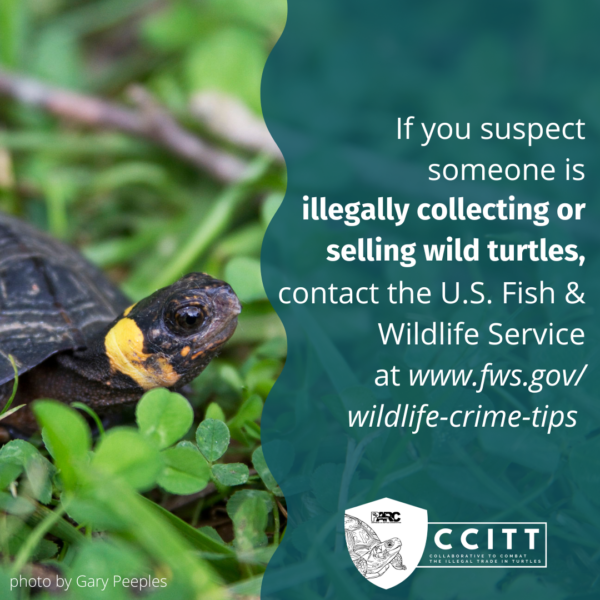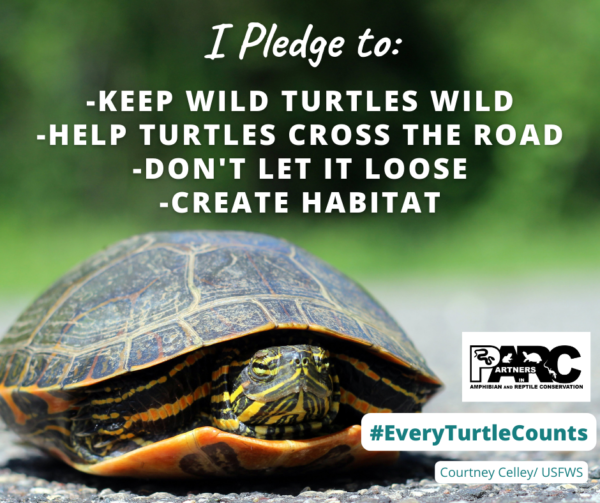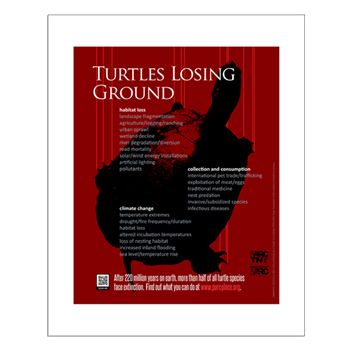Concerns over how demand for pet turtles is a primary driving factor on the illegal removal of our native, North American turtles and tortoises has given rise to our awareness initiative #EveryTurtleCounts.
PARC’s Collaborative to Combat the Illegal Trade in Turtles (CCITT) and our signatory partners: the Association of Zoos and Aquariums (AZA), the Wildlife Trafficking Alliance (WTA), the International Fund for Animal Welfare (IFAW), the Turtle Survival Alliance (TSA), and the Amphibian and Reptile Conservancy (ARC) have initiated a movement to garner additional support in recognizing the issue, raising the profile, and taking action to help keep native wild turtles wild.
Read our signatory partner letter here. The movement is growing! Check out these additional organizations that support the signatory partner letter.

Is your organization interested in joining the movement and endorsing the partner letter? Click here, and we’ll be in touch!
Turtles in Trouble
The U.S. is a global hotspot for turtle biodiversity. We are home to a greater number of terrestrial and freshwater turtle species than any other single country. In fact, many species are found only here. Our native tortoises and freshwater turtles are special, and we should care that they are losing ground.
Turtles are renowned for their long lives, but they also take a long time to reach reproductive age – often a decade or more. Because most hatchling turtles don’t survive that long (they are bite-sized snacks for predators), adults often must reproduce for their entire lives to ensure just one hatchling makes it to reproductive age to sustain the population. Read more about Where Have All the Turtles Gone, and Why Does it Matter here.
All of this together means the loss of adult turtles can contribute to population declines. When people take turtles out of the wild, they put entire populations at risk. Therefore, #EveryTurtleCounts.
Turtles as Pets
Wild turtles do not make good pets, and many collected from the wild do not survive or remain healthy in captivity. Turtles are a long-term commitment with some turtles living for over 50 years. Wild turtles also need specialized care and habitat requirements which can be costly. The Centers for Disease Control and Prevention recommend that children, pregnant women, and persons with compromised immune systems avoid contact with reptiles, including turtles, to avoid getting salmonella.
If you are thinking about purchasing a pet turtle, familiarize yourself with state, federal, and international wildlife regulations regarding the sale and possession of specific species. Always be sure to inquire about where a turtle came from before you consider buying one. It is important to #BuyInformed and make choices that matter. Another option is to check local animal shelters for unwanted pet turtles that need a new home. Some places include:
- California Turtle and Tortoise Club
- Central Mississippi Turtle Rescue
- Colorado Reptile Humane Society
- Eden Animal Sanctuary
- Georgia Herpetological Association and Rescue
- Mid-Atlantic Turtle and Tortoise Society
- Pet Finder
- Turtle Rescue League
Have an Unwanted Pet? Don’t Let Them Go!
Releasing unwanted pets into the wild is illegal in most states. Many released animals do not survive and have the ability to transmit disease to local wildlife. Here are a few options for unwanted pets:
- Don’t Let Them Loose Rehoming Resources
- Florida’s Exotic Pet Amnesty Program
- SEPARC Guide on What To Do with Unwanted Pets
Illegal Trade in Turtles
Did you know? Turtles are sometimes stolen from the wild and sold illegally. The Collaborative to Combat the Illegal Trade in Turtles (CCITT) is working to advance efforts to better understand, prevent, and eliminate the illegal collection and trade of North America’s native turtles.
If you suspect someone is illegally collecting or selling wild turtles, contact the U.S. Fish and Wildlife Service by phone (1–844-FWS-TIPS) or by visiting this page, or contact your state or provincial wildlife agency. #EveryTurtleCounts

How to Help Turtles
Growing awareness of the threats turtles face is helping support important conservation efforts needed to keep our U.S. turtle populations safe. Here are some actions you can take:
- Check out our Six Simple Actions to Save Turtles (PDF) and the US Fish and Wildlife Service page on How to Help Turtles. If you want to know how to help sea turtles, check out the NOAA page here.
- Found a Turtle In Trouble? Call for Help!
- Spread the word! Check out our Wild Turtle Week page for social media content.
- Educate others about our wild turtles. Check out the Turtle Networking Team for more information.
- Create habitat for wildlife in your own backyard or community. Check out the Garden for Wildlife page through the National Wildlife Federation.

Turtles Losing Ground Poster
Help spread the word about threats that turtles face with our brand new Turtles Losing Ground poster. This poster was designed by Pam Meier and the Northeast Partners in Amphibian and Reptile Conservation (NEPARC) Turtle Working Group.
There are two main options for receiving a poster:
- Purchase a poster or other merchandise from our Threadless store.
- Request a digital file to print on your own. To help us keep track of interest/use, we are asking you to fill out the following form. Once we receive your request, we will email you the files to print.

For More Information
Questions can be sent to: parc_coordinators@parcplace.org

